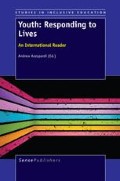Abstract
Before the general elections in 2009 in India, a leading, now global, Indian tea company launched an initiative targeting youth, by encouraging them to register and vote, appealing people to ‘wake up,’ thus, inviting wider political participation. This was a followed by a second campaign from the same company which sought to tap into the popular sentiment against corruption by urging citizens to stop bribing and switching to drinking tea (with tea cups emblazoned with the company’s logo being drunk by young men leading the change).
Access this chapter
Tax calculation will be finalised at checkout
Purchases are for personal use only
Preview
Unable to display preview. Download preview PDF.
References
Bhaduri, A. (2008). Predatory growth. Economic and Political Weekly, 43(16), 10-14.
Biesta, G., & Lawy, R. (2006). From teaching citizenship to learning democracy: overcoming individualism in research, policy and practice. Cambridge Journal of Education, 36(1), 63-79.
Biesta, G., Lawy, R., & Kelly, N. (2009). Understanding young people’s citizenship learning in everyday life: The role of contexts, relationships and dispositions. Education, Citizenship and Social Justice, 4(1), 5-24.
Brown, W. (2005). Edgework: Critical essays on knowledge and politics. Princeton: Princeton University Press.
Brown, W. (2006). American nightmare: Neoliberalism, neoconservativism and de-democratisation. Political Theory, 34(6), 690-714.
Dagnino, E. (2003). Citizenship in Latin America: An introduction. Latin American Perspectives, 30(2), 3-17.
Dagnino, E. (2007). Citizenship: a perverse confluence. Development in Practice, 17(4-5), 549-556.
deSouza, R., Kumar, S., & Shastri, S. (2009). Indian youth in a transforming world: Attitudes and perceptions. New Delhi: Sage Publications.
Furlong, A., & Cartmel, F. (1997). Young people and social change. Individualization and risk in late modernity. Sociology and Social Change Series. Buckingham: Open University Press.
Government of India. (1991). Budget speech of Mr. Manmohan Singh, Minister of Finance, Government of India. Presented on July 24, 1991. Retrieved from http://indiabudget.nic.in/bspeech/bs199192.pdf, on May 1, 2011.
Government of India. (2003). National youth policy. Department of Youth Affairs, Ministry of Youth Affairs and Sports, Government of India. Retrieved from http://yas.nic.in/index2.asp?linkid=47&slid=70&sublinkid=32&langid=1, on May 5, 2011.
Hall, T., Williamson, H., & Coffey, A. (2000). Young people, citizenship and the third way: A role for the youth service? Journal of Youth Studies, 3(4), 461-472.
Hiranandani, V., & Sonpal, D. (2010). Disability, economic globalization and privatization: A case study of India. Disability Studies Quarterly, 30(3/4). Retrieved from http://www.dsq-sds.org/article/view/1272/1302, on July 17, 2011.
Jhabvala, R., & Sinha, S. (2002). Liberalisation and the woman worker. Economic and Political Weekly, 37(21), 2037-2044.
Kabeer, N. (Ed.). (2005). Inclusive citizenship: Meanings and expressions. London: Zed Books.
Kumar, A. (2012). Educating the (neoliberal) citizen: Reflections from India. Development in Practice, 22(3), 361-372.
Kumar, V. (2006). Some sociological reflections on dalit youths. In V. Rajendran & P. D. Paul (Eds.), Youth and globalisation. Sriperumbudur: Rajiv Gandhi National Institute of Youth Development.
Larner, W. (2000). Neoliberalism: Policy, ideology and governmentality. Studies in Political Economy, 63(Autumn), 5-25.
Lukose, R. (2005). Empty citizenship: Protesting politics in the era of globalisation. Cultural Anthropology, 20(4), 506-533.
Marshall, T. H. (1950). Citizenship and social class and other essays. Cambridge: Cambridge University Press.
Miles, S. (2000). Youth lifestyles in a changing world. Philadelphia: Open University Press.
Melucci, A. (1992). Youth silence and voice. Selfhood and commitment in the everyday experience of adolescent. In J. Fornäs & G. Bolin (Eds.), Moves in modernity. Stockholm: Almqvist & Wiksell International.
Pal, P., & Ghosh, J. (2007). Inequality in India: A survey of recent trends. DESA Working Paper 45, Department of Economic and Social Affairs. New York: United Nations. Retrieved from http://huwu.org/esa/desa/papers/2007/wp45_2007.pdf, on March 25, 2011.
Rajendran, V., & Paul, P. D. (Eds.). (2006). Youth and globalisation. Sriperumbudur: Rajiv Gandhi National Institute of Youth Development.
Rajiv Gandhi National Institute of Youth Development (RGNIYD). (2010). National youth policy: 2010, Draft. Rajiv Gandhi National Institute of Youth Development, Sriperumbudur. Retrieved from http://117.211.93.114/youth_policy_2010/Draft%20NYP%2010.12.2010.pdf, on August 28, 2011.
Ruth, J. L., & Brooks-Gunn, J. (2003). What exactly is a youth development program?: Answers from research and practice. Applied Developmental Science, 7(2), 94-111.
Shah, G. (Ed.). (2001). Dalit identity and politics: Cultural subordination and the dalit challenge. New New Delhi, Thousand Oaks, CA: Sage.
Shah, G., Mander, H., Thorat, S., Deshpande, S., & Baviskar, A. (2006). Untouchability in rural India. New Delhi, Thousand Oaks, CA: Sage.
United Nations Development Programme (UNDP). (n.d.). Poverty reduction and livelihood promotion, India. Retrieved from http://www.undp.org/content/india/en/home/ourwork/povertyreduction/overview.html, on September 10, 2012.
Uprichard, E. (2008). Children as ‘being and becomings’: Children, childhood and temporality. Children and Society, 22(4), 303-313.
Urciuoli, B. (2008). Skills and selves in the new work-place. American Ethnologist, 35(2), 211-228.
World Bank. (2006). Development and the next generation: World Development Report, 2007. Washington DC: The World Bank.
World Bank (n.d.). Projects and operations in India. Retrieved from http://www.worldbank.org/projects/search?lang=en&searchTerm=&countryshortname_exact=India&src=, on September 1, 2012.
Young, B. (1990). Television advertising and children. Oxford: Clarendon Press.
Author information
Authors and Affiliations
Editor information
Editors and Affiliations
Rights and permissions
Copyright information
© 2013 Sense Publishers
About this chapter
Cite this chapter
Kumar, A. (2013). Serv(ic)Ing the Country?. In: Azzopardi, A. (eds) Youth: Responding to Lives. Studies in Inclusive Education. SensePublishers, Rotterdam. https://doi.org/10.1007/978-94-6209-431-4_3
Download citation
DOI: https://doi.org/10.1007/978-94-6209-431-4_3
Publisher Name: SensePublishers, Rotterdam
Online ISBN: 978-94-6209-431-4
eBook Packages: Humanities, Social Sciences and LawEducation (R0)


